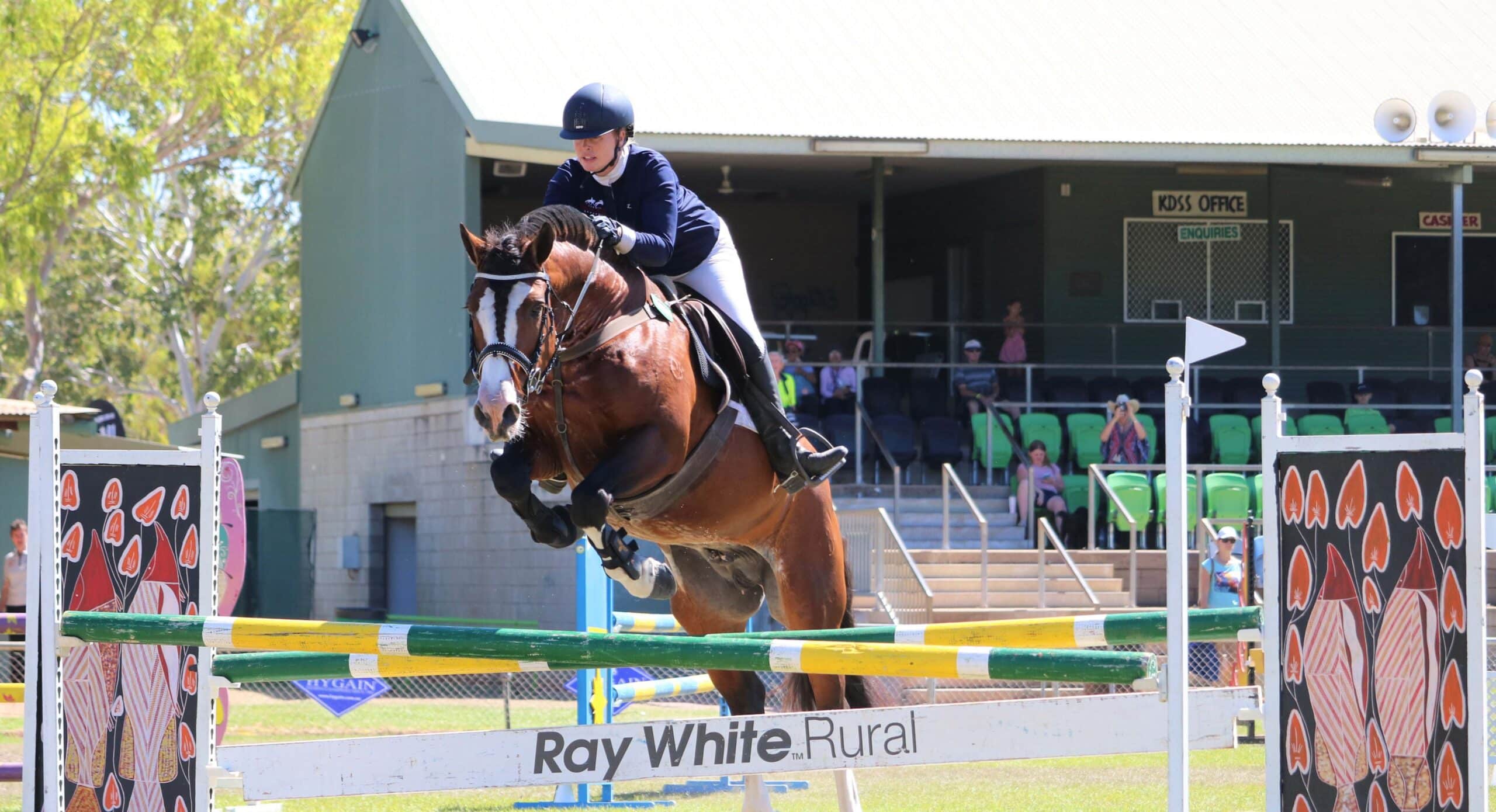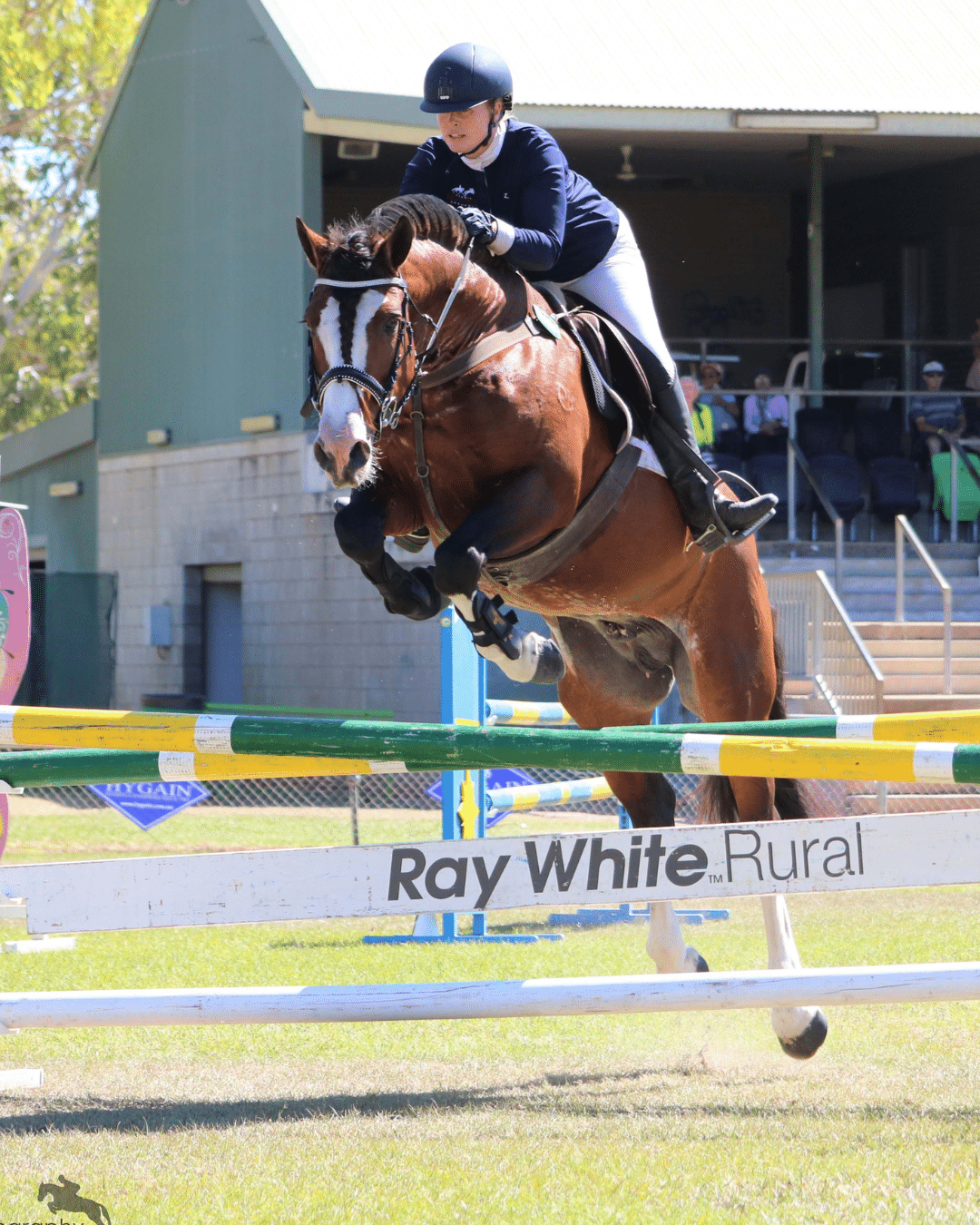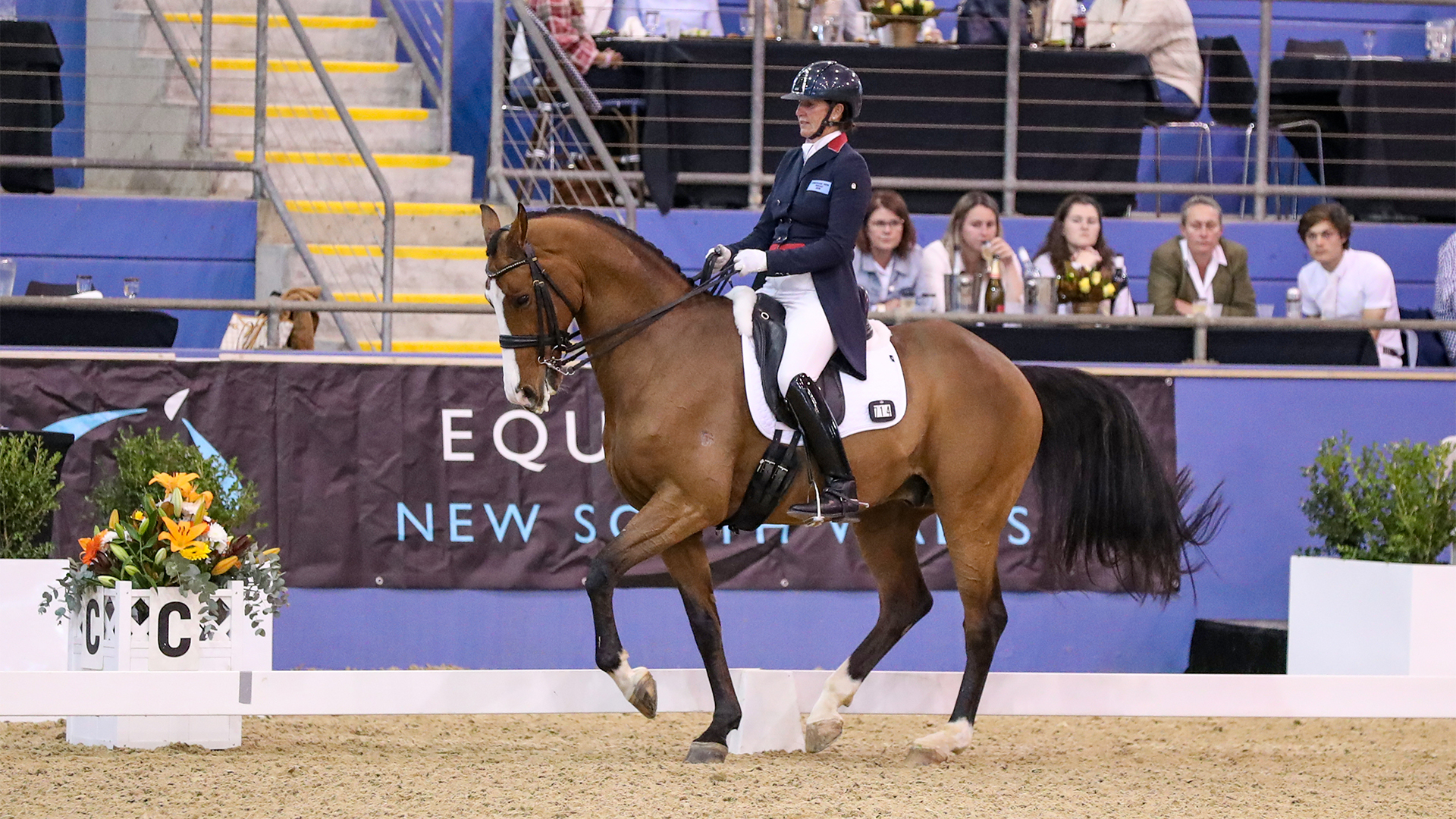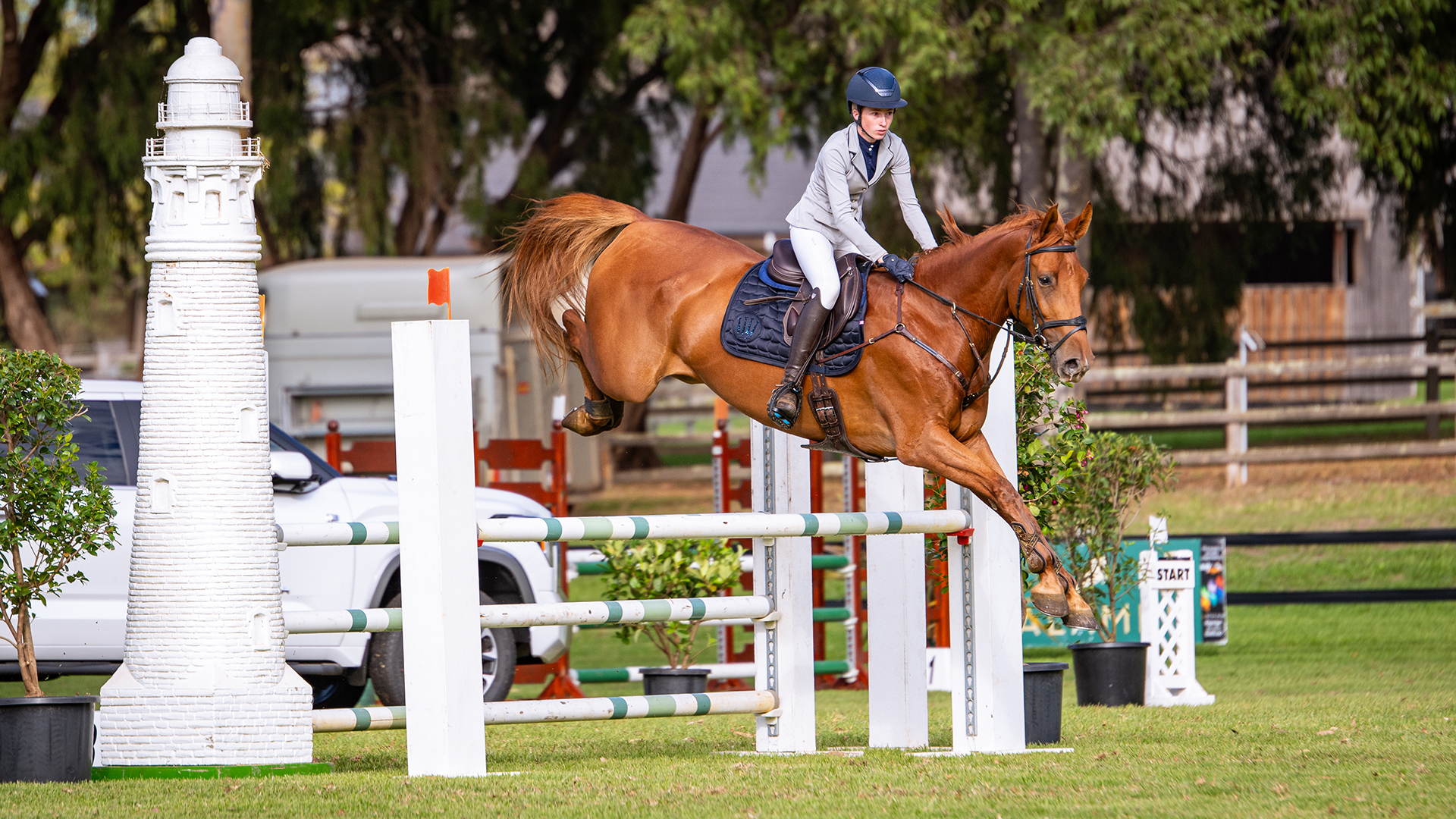Growing up in the Northern Territory, Nicole Mutimer taught herself to ride with grit and determination. Following a “20-year apprenticeship”, Nicole now leads the way in managing horses and mentoring riders in Australia’s Top End through a combination of equitation science, climate-specific care and nutrition – and outback resilience.
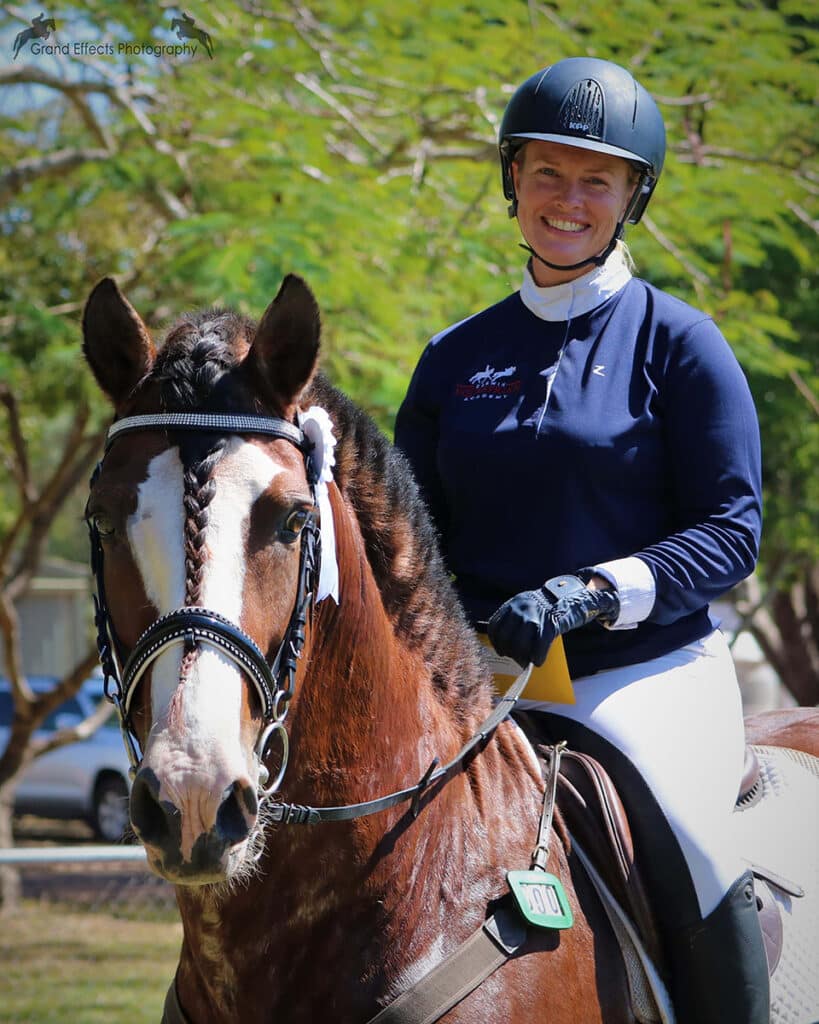
Nicole Mutimer is based in Darwin and runs the Northern Territory Institute of Equestrian Sport. Image by Grand Effects Photography.
Raised in the remote town of Larrimah more than 400km south of Darwin, Nicole Mutimer wasn’t taught how to ride – not that it stopped her. “It was hard, rough country and horses were there to do a job. I got a horse and through trial and error I learnt what not to do and how to stay on… most of the time!” explains Nicole.
When Nicole reached high school age her family moved to Darwin. Previously a School of the Air student, walking into a classroom of 30 kids was a culture shock. “Everything was foreign and fitting in at school was hard. Horses were the one constant, the one thing that felt like home.”
Nicole immersed herself in horses – and while her family were supportive, they didn’t have the resources to buy anything flash. “I had to make do with what I could get… off-the-track Thoroughbreds were cheap and accessible. Looking back, I was well out of my depth with very little knowledgeable support and no idea how to retrain a racehorse,” she reflects.
Joining Pony Club gave her access to coaching for the first time. “I loved learning and refining my riding. And believe me, my riding needed a lot of tidying up. I often joked that I was probably the reason for a lot of the gear rules… no bailing twine or electrical tape! And I think they prefer horses to be broken in. Looking back, I wouldn’t have been surprised if every Sunday there was a serious game of paper, scissors, rock happening between coaches to see who didn’t have to take the bush kids!”
What Nicole may have lacked in refinement, she made up for with guts and determination. “I think I still hold the fastest time on cross country – although it’s arguable if it was intentional!” she laughs. She competed across several disciplines, including show jumping, mounted games, and polocrosse. “I loathed dressage and often cited that my lack of interest was due to it being slow and boring! The truth was, I was terrible at it. My horses didn’t have enough education for dressage and neither did I,” she reflects.
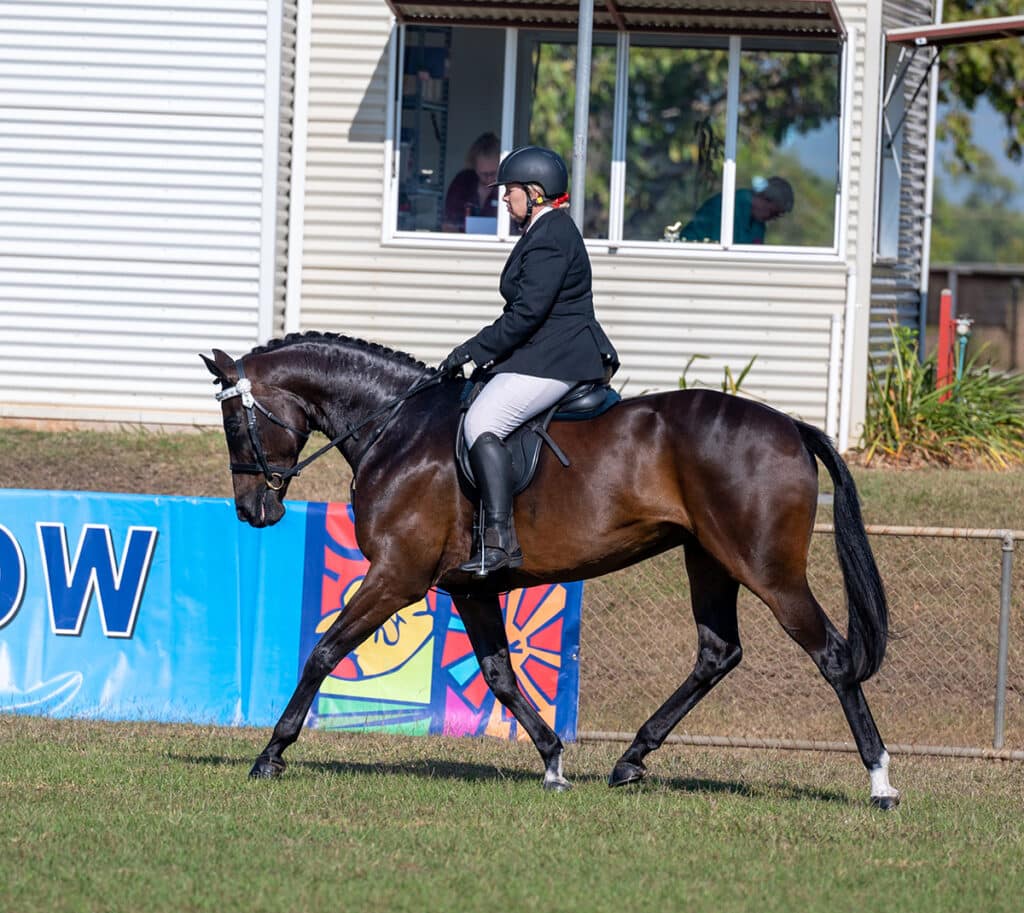
Nicole in the show ring with her horse Jazz. Image by Julie Wilson Photography.
“Horses were the one
constant, the one thing
that felt like home.”
“I could stay on a horse – I’d learnt that pretty good. But I hadn’t learnt anything technical, I didn’t know how to train a horse. I’d been trying to do it on my own with not really any support. I did struggle a fair bit early on.”
Some say hard horses make good riders, but Nicole disagrees: “They don’t; struggling just makes it hard to learn. When you’re on a green horse it’s difficult because you’re constantly in a space where you’re having to manage the horse, manage behaviours and manage anxiety – in yourself and the horse. The right horse at the right time is the key. There are things to learn from hard horses, but only once you have the appropriate skills and support.”
Nicole’s appreciation for her Pony Club coaching, and her realisation of how good support could really help riders grow and progress, would go on to guide her career later in life.
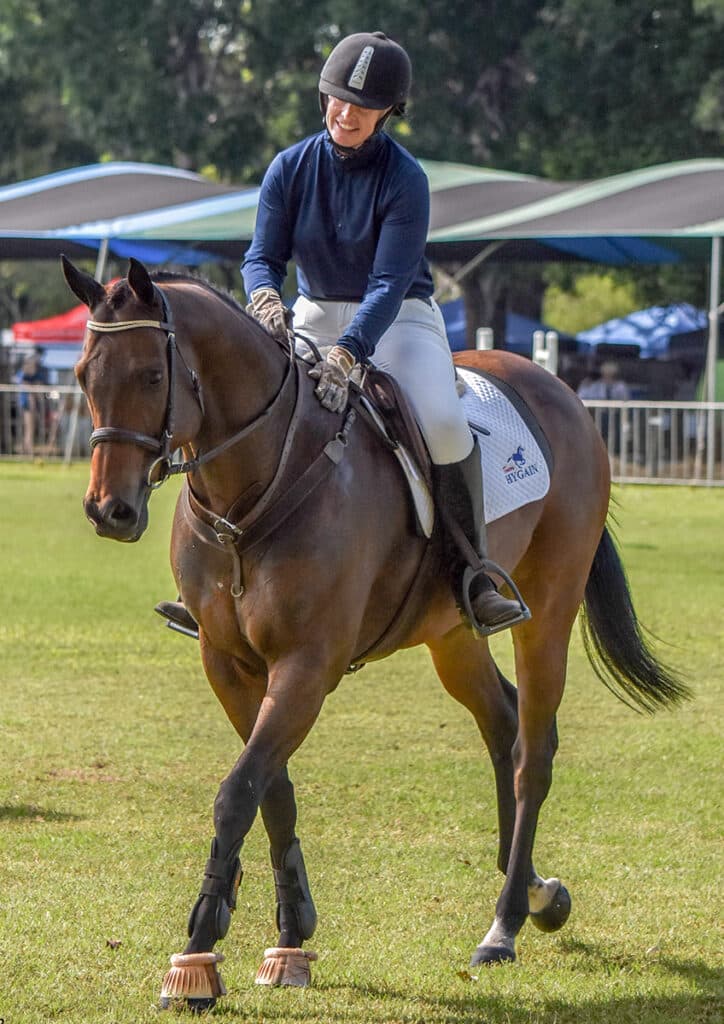
Nicole with Mon Amour competing at Fred’s Pass Reserve, which is the main equestrian competition facility near Darwin. Image by Tegan Cann Photography.
TURNING POINT
Nicole’s first job was with a talented local rider and trainer who bought and sold a lot of horses. “I was just cleaning stables and feeding horses, but I would often watch her train and aspired to be able to ride like that. I realised that if I wanted to train horses, I needed to get good at it and that meant getting educated.”
A real turning point arrived via an opportunity to campaign an educated dressage horse who had bucked his rider off and broken her leg. “Although he was big and strong, he had some cool buttons, and it was the first time I’d had the opportunity to ride an educated horse. I enjoyed the detail that I could get out of him, and we went on to win many dressage events. He was the catalyst for my love of dressage.”
During her teenage years, Nicole worked hard on her riding and had many successes. “In my late teens I started training OTT horses, campaigning them, and then selling them on for show jumping, dressage, and polocrosse,” she says. Unfortunately, she wasn’t very good at selling them. “I got too attached and wanted to keep them all, so I came to the conclusion that the buying and selling game wasn’t for me!”
Nicole says her version of training back then was a far cry from how she trains horses now. “I didn’t have enough experience to be able to problem solve many of the behaviours that I encountered, and as a result I had a lot falls, and sadly, some of those horses I probably didn’t help much at all. As I tell my students now, horses are a 20-year apprenticeship! And then after that you keep working on mastering your trade.”
ENTER EQUITATION SCIENCE
On finishing school, Nicole studied science at university. She took a role with the NT Police where she worked in various areas, including doing assessments and training for the Mounted Police, and later with the Juvenile Diversion Unit where she developed and delivered successful equestrian diversionary programs for youth offenders.
Meanwhile, Nicole continued to train and compete horses, winning several Horse of the Year titles, Supreme Champion Show Horse titles at Darwin Royal Show, and open show jumping awards. In 2012, she was named Australia Day Sportsperson of the Year for her contribution to equestrian sports both as a coach and competitor.
Nicole’s interest in science never waned, and she ultimately went back to university and studied Equitation Science, gaining a diploma. What she learnt greatly influenced the way she now trains.
“My knowledge of horse behavioural science and biomechanics has helped put better practices into our training methods so that we can train in accordance with the horse’s natural instincts and cognitive ability. It’s important to work horses in a way that results in less stress and better learning. That’s how I train horses and that’s how we train riders in our ranks, using that behavioural science to make sure that we’re looking after the horse’s welfare and also increase rider safety.
“Thankfully, horsemanship training practices are starting to move away from dominance-based training, where chasing the feet and flooding horses to desensitise them is proving to be less efficient than more ethical methods of shaping behaviours using behavioural science. If we want positive change, then we need to be the change!” muses Nicole.
LOVE OF COACHING
The riders in Nicole’s ranks are the students at Northern Territory Institute of Equestrian Sport – a training and coaching business she began in 2013 after the birth of her second child. It’s a business that allows her to provide coaching and support to young riders in Darwin, a service she knows the importance of all too well through her own early experiences.
Nicole oversees a dressage and jumping team with riders ranging from entry level through to Medium and 1.20m. Her aim is to bridge the gap between recreational riding and competition and ensure young riders have the support to successfully make that leap. “They’re supported and they’ve got a group of riders around them who are all going to do it together,” she says.
Nicole has also been an NT National Interschool Coach for several years, and a three-time finalist in the NT Coach of the Year Awards. “I love coaching and helping riders to achieve their dreams. Riding is for everyone at any level and any age. I believe that a lot of people will go their whole life and never find that ‘thing’ they are really passionate about, that something that fuels their soul. So, when you do find it, you need to do everything you can to keep that dream alive.”
BACK TO OFF-THE-TRACK HORSES
Despite some of her early struggles, Nicole has never lost her love for Thoroughbreds and is still involved in retraining them. As an approved Off The Track Educator for Thoroughbred Racing NT, she works closely with many trainers and new OTT owners.
“Part of it is educating people about the differences and the behaviours that we might expect to see in off-the-track horses to try and set that horse up for a successful career after racing. A lot of people just assume they’ve got all the buttons that a normal horse would have – but they don’t, because they don’t need them as racehorses.”
Nicole explains, for instance, that ex-racehorses aren’t well versed in “go” and “turn”, as they are not generally aids required of them: “go” is often dictated by rein release rather than leg pressure, and turning isn’t as much of a requirement when there is a rail to follow. “I enjoy that education space and I’m a big advocate for off-the-track horses. They’re good to work with, are incredibly trainable, and have a great work ethic.”
Nicole’s work with OTTs was recognised last year when she was presented with the prestigious Thoroughbred Care and Welfare Award at the 2024 Australian Racing Awards on the Gold Coast.
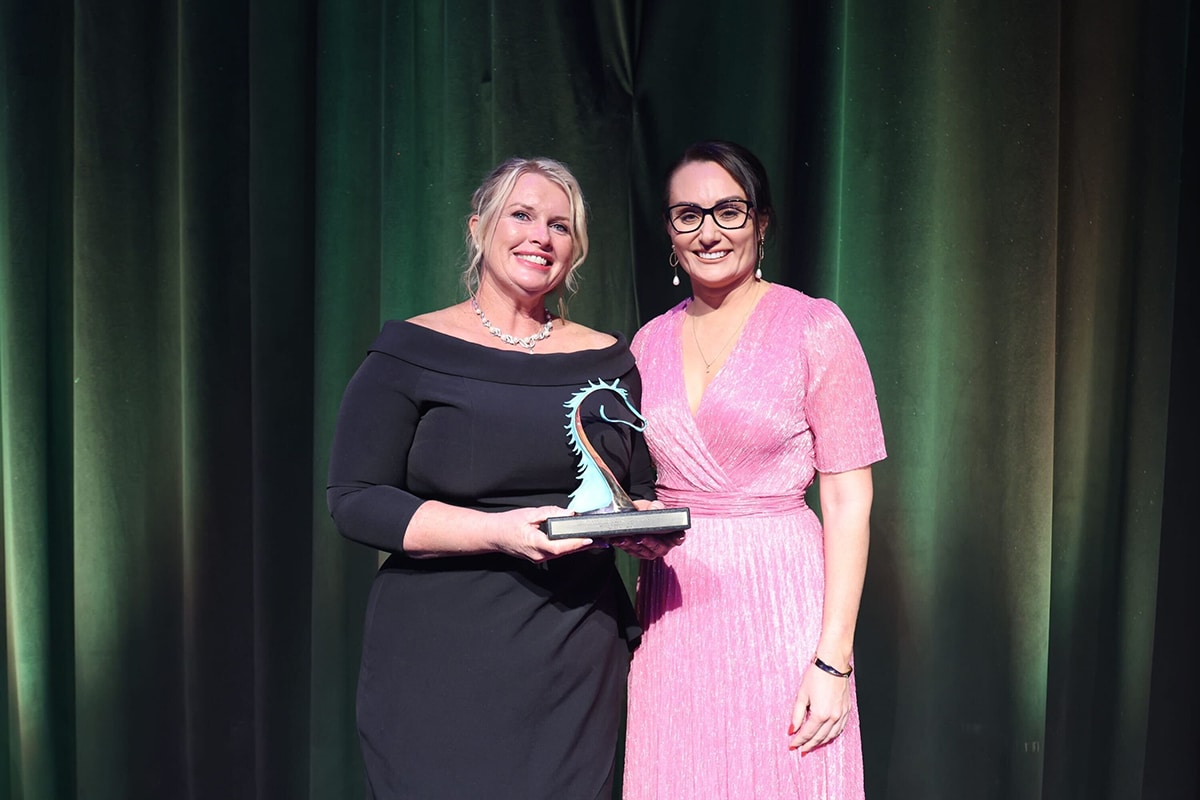
Nicole (left) was presented with the prestigious Thoroughbred Care and Welfare Award at the 2024 Australian Racing Awards on the Gold Coast.
NUTRITION IN THE TROPICS
“Every environment poses its own difficulties, but we certainly have a fairly unique environment, and it does have its own challenges – particularly during the wet season,” says Nicole of managing horses in Darwin.
During the wet season, the heat and humidity are relentless. It rains constantly, and with the tropical environment comes the perfect breeding ground for bacteria. Any minor wound or cut becomes difficult to heal, and even basic care routines become complicated. “Even small wounds need to be bandaged and kept clean, dry, and covered,” explains Nicole. Rain scald must be closely monitored, and biting insects need to be mitigated with fly spray, repellent creams, and the use of fans in stables.
“Horses’ feet are saturated for months, leading to issues such as hoof abscesses, bruised souls, thrush, or simply a deficit in hoof growth as the soft hoof will wear back quicker than it grows. I make sure that my horses are in dry sand stables. Horses that are being ridden over the wetter months all have front shoes on to protect their feet from excessive wear when they’re soft.”
Riders often reduce their workload in the wet season, but Nicole and her team continue training, even if it’s torrential rain. “We say around here, ‘the only thing that stops training is lightning!’”
Of course, heat is a major factor and must be taken into account. “The wet bulb temperature here is often off the chart due to high humidity, no breeze, and no evaporative cooling. Horses sweat, but they can’t cool down. That’s why everything gets iced after training – sometimes even before. We use an ice bath to manage body temperature, and it’s non-negotiable during those months.”
Heat stress and tying up are two concerns riders must be very mindful of when working horses in the tropics. In fact, due to the heat and animal welfare, there are no eventing competitions in the Northern Territory.
Another condition to watch out for is anhidrosis, commonly known as ‘puffs’, where the sweating mechanism shuts down, resulting in the horse not being able to cool itself. “Horses that develop anhidrosis appear to ‘puff’ because of the elevated respiratory rate,” notes Nicole. “The humidity is a major contributing factor to this condition, although we also know that certain feeds can contribute to metabolic heat and raising the core body temperature.”
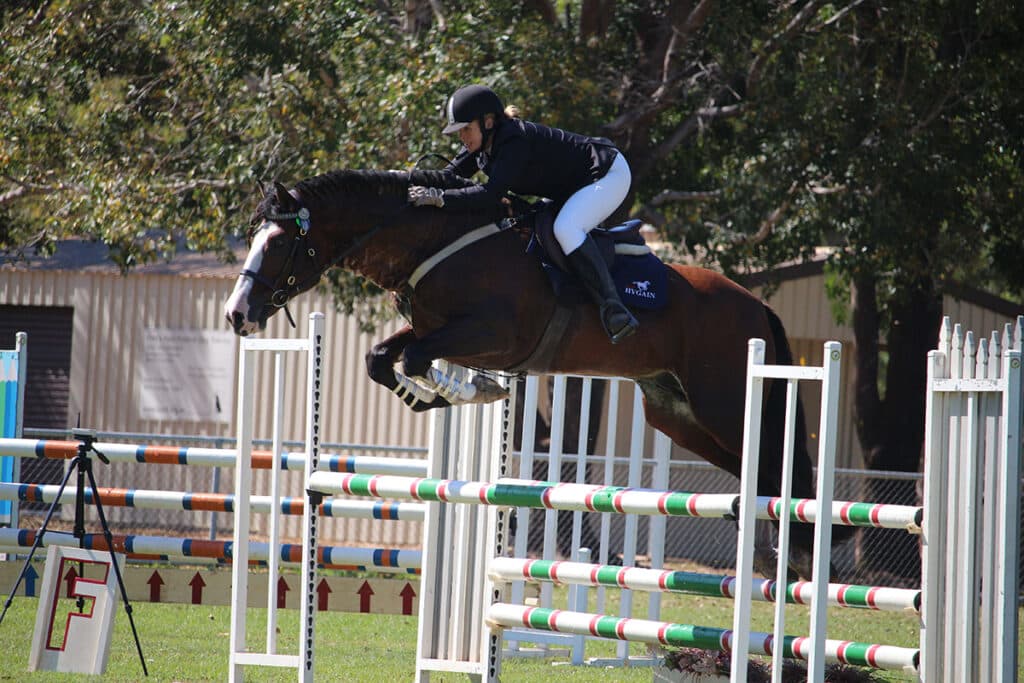
Competition in the NT takes placing during the dry season (winter). Image by Grand Effects Photography.
Nicole therefore looks for ‘cool’ feeds – not low in energy, but low in metabolic heat production.
“In cold climates, they talk about feeding lots of bulk roughage in the way of hay to help horses keep warm. The digestion of fibre produces metabolic heat due to the fermentation process in the hind gut and becomes like an internal heater. When we are trying to keep horses cool, we need to feed more soluble fibre that is easier to digest and less heating.”
Nicole has used Hygain feeds for around 15 years, more recently has become an ambassador. She finds the range perfect for managing the multi-faceted needs of horses in the tropics.
Hygain’s nutritionally enhanced digestive fibre nuggets, Fibressential®, is Nicole’s go-to ‘cool’ fibre source. “It’s a great soluble fibre alternative that reduces the need for bulky, heating hay,” she explains.
“We notice horses drop condition during the wet season – there’s a real stress cost,” she continues. “Our staple feed for maintaining condition, especially off-the-track Thoroughbreds, is Tru Care®.” To further help maintain weight without excess heat from digestion, Nicole adds that Tru Gain® is a high-fat supplement that works well.
Nicole explains that with Thoroughbreds in particular, it’s important to ensure they are fed enough when they first come off the track – even though it may be tempting to cut back feed as a means to reduce energy.“When they first come off the track, Thoroughbreds look amazing – shiny coats, muscled up, supreme athletes. But we know their metabolism is on overdrive. They drop muscle quickly, and it takes 12 months or so for that metabolism to regulate. We use feeds like Tru Care® to let them down gently off hot race feeds while supporting condition and mental wellness. A feed like Zero® can also be excellent for this transition – low starch, no grains, and it can still help maintain condition.”
Electrolyte loss via sweat must also be addressed. “Electrolytes are critical here due to constant sweating,” says Nicole, who uses Regain® to combat that concern. Poor pasture quality is also a problem up north, so Allcare® is added to feeds to ensure horses are getting essential vitamins and minerals.
“Our pastures are nutrient-poor due to leached soils and heavy rainfall. Even with green grass available, it does little nutritionally, especially for Thoroughbreds. Without proper supplementation, horses can look healthy but suffer long-term issues. It’s a hidden threat, and Allcare® helps us prevent those silent issues.”
With biotin in the mix, Allcare® supports hoof health, and Nicole also uses Gleam® for some horses to give them an extra boost.
“For all the challenges that the wet season presents, it’s all made right on that first glorious dry season morning,” smiles Nicole. “The blue skies, the crisp dry season air and the dragon flies that signal the change of season.” It’s the time when riders are focused on getting their horses fit and out competing. “If Darwin weather was like it is in the dry season all year round, everyone would live here!”
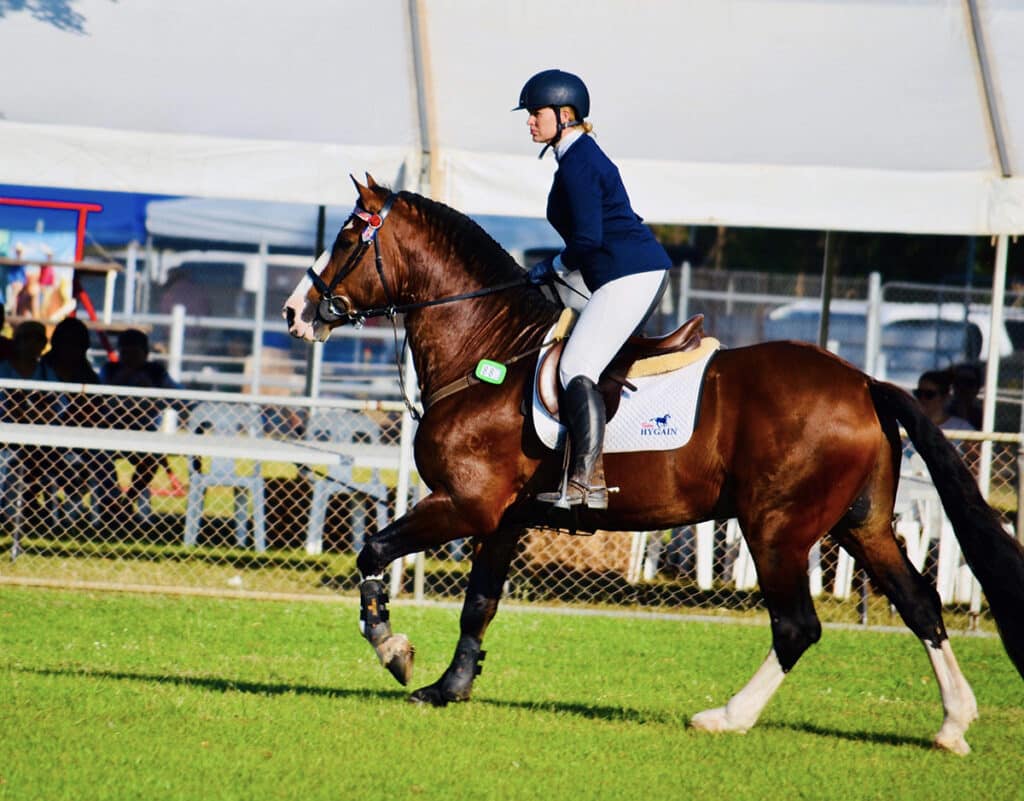
Nicole and her horse Jack competing at the Royal Darwin Show. Image by Grand Effects Photography.
THE NT EQUESTRIAN COMMUNITY
While there are certainly challenges managing horses in the Top End, Nicole wouldn’t trade it for anywhere else in Australia.
“One of the advantages of being somewhat isolated is that we don’t travel very far for competitions. All our local showgrounds are within a 30-minute drive. Once a year, we travel three hours to the Katherine Show and that would often be the extent of our travel,” explains Nicole.
This year, however, Nicole and the team do have some travel planned, as they are making the 1500km trip south to Alice Springs Show in July where the sub-zero overnight temperatures are certainly a novelty!
For Nicole, the sense of community among equestrians in the NT is what she loves most. “Despite the challenges, it’s a close-knit, supportive environment. Even visiting officials comment on how friendly and welcoming our events are. The resilience of riders up here is remarkable – we ride in monsoonal rain, deal with extreme heat, and still show up. That determination builds a strong community spirit.” EQ
This article was written in conjunction with Hygain. For more information regarding their product range, click here.
